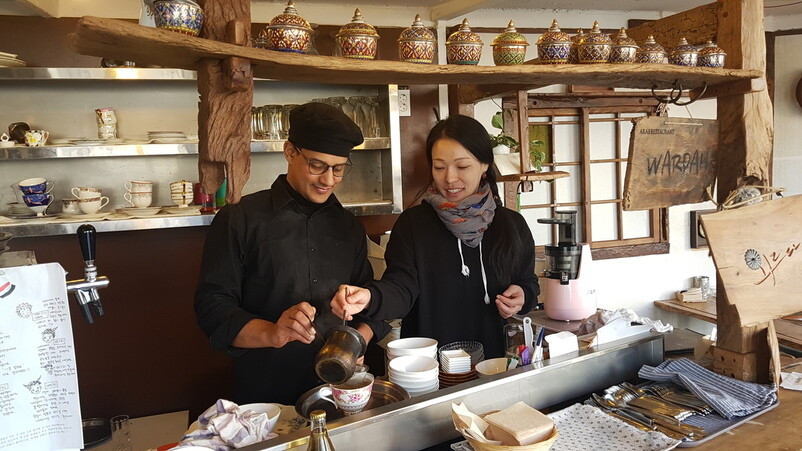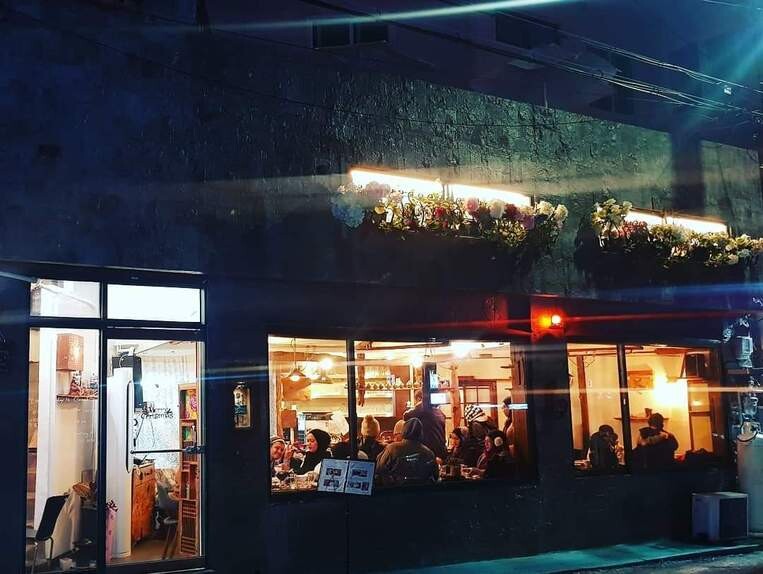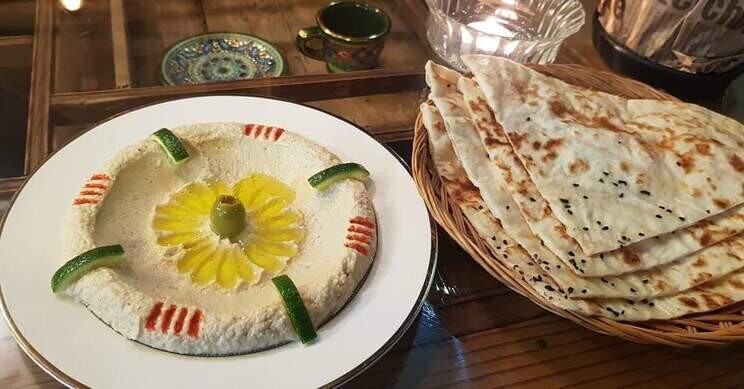hankyoreh
Links to other country sites 다른 나라 사이트 링크
Romance between Yemeni refugee and Jeju woman blossoms into marriage

Last November, Jeju resident Ha Min-gyeong (“Warda”), 39, and Yemeni Mohammad Al-Mamari, 36, opened a small restaurant together at the entrance to a narrow side street in Jeju City’s Samdo #2 neighborhood. Ha was in charge of taking orders and serving food, while “Amin” (Al-Mamari) prepared food in the kitchen. The restaurant was called Warda, after the name given to Ha by the Yemenis who arrived in Jeju last year. In Arabic, the word “warda” means “flower.” This April, Warda and Amin are set to marry under the spring sunshine in Jeju.
Warda Restaurant is the only dining establishment in Jeju that sells halal dishes (food that Muslims can eat according to Islamic law). Amin described it as a “place where Arabs and Koreans become friends.” He is one of over 500 Yemeni nations who arrived in Jeju last May after fleeing a war back home.

Ha teaches traditional Korean music at an elementary school. It is late in the afternoon when she arrives at the restaurant. Amin holds down the kitchen from the restaurant’s opening time at noon until 10 in the evening. Speaking a mixture of English, Arabic, and Korean, the two of them would “laugh and talk about the restaurant and food.” Eventually love blossomed.
“I didn’t pick up on it at the time, but it wouldn’t have been at all strange,” said Lee Ye-su, a friend of Ha who runs Warda along with the couple.
The wedding is to be a traditional Korean affair, taking place on the morning of Apr. 7 at Jeju Hyanggyo Confucian School in Jeju City’s Yongdam #1 neighborhood. Speaking to the Hankyoreh at Warda Restaurant on Apr. 1 and 2, the couple attributed the love that developed between them to “respect.”
“Min-gyeong respects me, and I respect Min-gyeong,” Amin said. “We also have a lot of terrific friends who respect us. These unexpected encounters have been a blessing in my life.”
Ha added, “I only speak a little Arabic and English, while Amin speaks only a little Korean and English. Yet for all that, we’re really in tune with each other. Even when we have the occasional fight, we use a mixture of gestures and words until we’re finally laughing.”
The invitations extended to their friends were written in the same three languages that united the two of them in love: Korean, English, and Arabic. “We invite you to the wedding of two wonderful people who are warm and kind and help others,” they read.
In the beginning, Ha did not even know where Yemen was. She learned about the Yemenis’ arrival on Jeju Island in early June of last year. It had been an unusually cool and rainy day in Jeju. Ha, who studied Korean dance and music in university, has a rehearsal studio measuring around 100 square meters.
“I contacted someone who was helping the refugees and told them, ‘I have an empty studio. Do you think that would be okay?’” she recalled.
“Anything with a roof on it,” came the reply. Around 10 Yemenis arrived at Ha’s studio that very day. By the end of the year, around 100 had passed through its doors.
The difficulties of eating in Korea for Muslims
Food was always an issue. Only allowed to eat food prepared according to Islamic law, Muslims have to check the label for pork-based ingredients when eating something as simple as jelly. Jeju Island has over 20,000 registered foreign residents, most of them Muslims who work on farms or fish farms. At the time, there was no restaurant on Jeju serving proper halal food.
This was the origin of the idea for Warda Restaurant. Amin, who was then working on a ship off the Jeju coast, had previously worked as a cook in Yemen and Malaysia.
“It was a place for testing your capabilities by making test foods like spaghetti, salad and soups. I was recognized for my abilities and became a chef,” he explained.

On the evening of Apr. 1, there wasn’t an empty table in the restaurant. Among the people comfortably enjoying halal cuisine were tourists from Malaysia, Yemenis who have settled on Jeju, and Indonesian migrant workers who said they had driven the hour-distance from a Seongsanpo fishery.
“It all happened like flowing water,” said Ha.
“For that reason, I don’t want this marriage to come across as something special. It’s just something that came from a chance encounter,” she said.
Last year, nothing happened anywhere on Jeju or mainland South Korea to justify the “refugee panic.” Instead, the situation bore its own tiny fruit with the love that grew between Warda and Amin.
By Lim Jae-woo, staff reporter
Please direct comments or questions to [english@hani.co.kr]

Editorial・opinion
![[Column] A death blow to Korea’s prosecutor politics [Column] A death blow to Korea’s prosecutor politics](https://flexible.img.hani.co.kr/flexible/normal/500/300/imgdb/original/2024/0415/7517131654952438.jpg) [Column] A death blow to Korea’s prosecutor politics
[Column] A death blow to Korea’s prosecutor politics![[Correspondent’s column] The US and the end of Japanese pacifism [Correspondent’s column] The US and the end of Japanese pacifism](https://flexible.img.hani.co.kr/flexible/normal/500/300/imgdb/original/2024/0412/1017129080945463.jpg) [Correspondent’s column] The US and the end of Japanese pacifism
[Correspondent’s column] The US and the end of Japanese pacifism- [Guest essay] How Korea turned its trainee doctors into monsters
- [Guest essay] As someone who helped forge Seoul-Moscow ties, their status today troubles me
- [Editorial] Koreans sent a loud and clear message to Yoon
- [Column] In Korea’s midterm elections, it’s time for accountability
- [Guest essay] At only 26, I’ve seen 4 wars in my home of Gaza
- [Column] Syngman Rhee’s bloody legacy in Jeju
- [Editorial] Yoon addresses nation, but not problems that plague it
- [Column] Can Yoon and Han stomach humble pie?
Most viewed articles
- 1[News analysis] Watershed augmentation of US-Japan alliance to put Korea’s diplomacy to the test
- 2[Guest essay] How Korea turned its trainee doctors into monsters
- 3[Column] A death blow to Korea’s prosecutor politics
- 4[Photo] Cho Kuk and company march on prosecutors’ office for probe into first lady
- 5‘National emergency’: Why Korean voters handed 192 seats to opposition parties
- 6Exchange rate, oil prices, inflation: Can Korea overcome an economic triple whammy?
- 7[Column] A third war mustn’t be allowed
- 8Japan ramps up efforts to remilitarize, integrate with US to deter China
- 9After Iran’s attack, can the US stop Israel from starting a regional war?
- 10[Correspondent’s column] The US and the end of Japanese pacifism